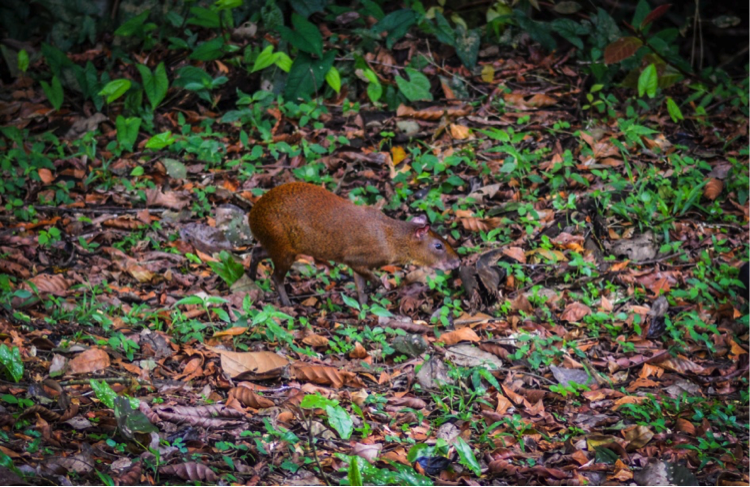
For our conservation project, we focused on the foraging behavior of the agouti in Refugio Bartola, Nicaragua. We were interested in the potential effects of selective logging on agouti fitness, which may have important conservation implications due to their importance as an important seed disperser and as a food source for many large predators. It is known that selective logging can reduce understory cover, which is known to serve as protection from predators for some species of small mammals.
From previous studies, we knew that agouti restrict their activity to times when predator activity (primarily ocelot and other large cats) is lowest. This is an important general concept in animal behavior – all organisms must acquire resources to survive, but foraging exposes them to increased levels of predation, and thus they must evolve behaviors that resolve this tradeoff. We were curious if agouti might also utilize spatial mechanisms of predator avoidance to do this, selectively foraging in areas in which they are better hidden from predators, and whether this preference varies during the day as predator pressure varies. From a conservation standpoint, this is important because decreases in understory cover from logging may have significant and complex effects on agouti fitness if this is indeed the case; given their important roles as prey and dispersers, this could have cascading effects on the structure and functioning of rainforest communities.
In order to test whether populations of agouti and other small mammals in the Nicaraguan rainforest exhibit such a preference, we studied their foraging habitat selection through a camera trap study. We baited sites of both dense understory cover and open understory cover, with at least one of each near previous agouti sightings, but with a minimum distance exceeding that of the agouti home range size, in order to minimize resampling the same individuals. The sites were restocked with bait every other day, and we observed them for between 4-12 days. We then were able to convert the images into foraging rates (visits per unit time) for different periods of the day in open and closed understory, which allowed us to examine the interaction of time of day (as a proxy for predator pressure) with preference for these different degrees of cover.
Our study yielded interesting but counterintuitive results – interestingly, the primary interaction of foraging rate with time of day was in closed understory. In dense understory, at times when predation is highest (just following dusk according to the literature) agouti foraged at much lower rates than at times when predation is thought to be lower (dawn and day). However, in open understory, there was much less of a difference between dusk and daytime foraging rates, and no difference between dawn and dusk foraging rates. This is the exact opposite of what we predicted: we would have expected that there would be a larger response to predation pressure in open understory, where the agouti are more exposed. However, this may make sense – agouti are known to cache food in open areas, and their main – and successful – means of escape from predators is to observe them before they attack and run away. Thus, open understory might actually be more protective from predators than closed understory – while agouti can be seen more easily, they can also see predators more easily. To get at this question more deeply in the future, studies would need to quantify the actual levels of predator pressure at different times in different areas of cover, which we were unable to do due to time constraints.

